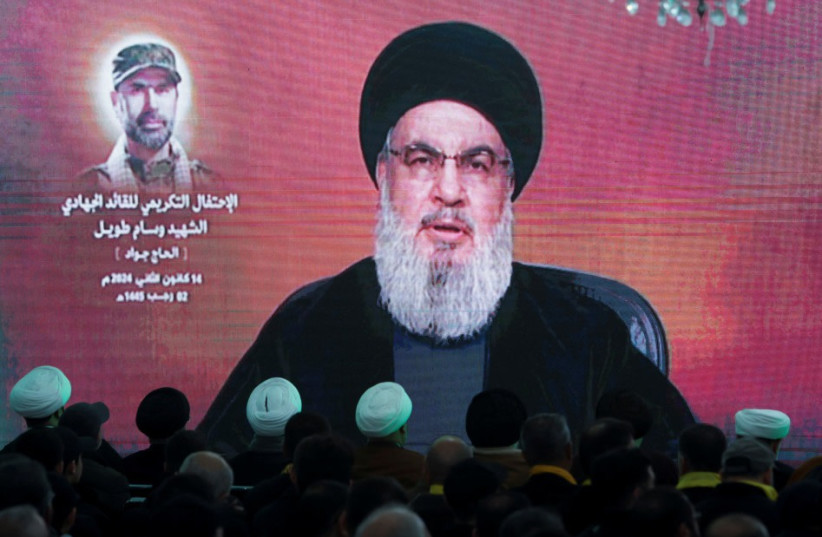Can Israel assassinate Nasrallah? And does it want to?
Asharq Al-Awsat, London, June 20
The current secretary-general of Hezbollah, Hassan Nasrallah, has arguably been the most consistent figure in leading the party, which subscribes to the Shia ideology of the Guardianship of the Islamic Jurist. At 64, Nasrallah has been at the helm of Hezbollah since 1992, with his tenure spanning over three decades and well into a fourth. This longevity surpasses most Arab and potentially even Islamic world leaders. Only Ali Khamenei, the Supreme Leader of Iran and the head of the Guardianship of the Jurist since 1989, has held a comparable role for a longer period, predating Nasrallah’s leadership by a few years.
Throughout these years, we have witnessed Nasrallah’s impassioned speeches and strategic maneuvers within Lebanon and on the broader regional stage. His rise and influence have unfolded before our eyes, from the days when his hair was black and he embodied youthful zeal, to the present, where signs of aging have taken their toll. His ability to attract mass support for propaganda is undeniable. Hezbollah, under Nasrallah’s leadership, reached its zenith during the 2006 war with Israel – a conflict he and his followers hailed as a divine victory.
During this period, we saw figures from various ideological currents, including some Muslim Brotherhood members and Sururists, as well as “intellectuals” and activists within the so-called “Axis of Resistance,” flocking to meet Nasrallah in the southern suburbs of Beirut. This was before he transitioned to a life of semi-concealment, appearing mainly on televised broadcasts from undisclosed locations, due to security concerns.

Recent reports suggest that Iran has issued a warning to Nasrallah about an Israeli plot to assassinate him. These assassination threats, some substantiated and others debatable, are nothing new. Notable figures, such as Hezbollah Secretary-General Abbas Al-Musawi, military and security commander Imad Mughniyeh, and Mughniyeh’s successor Mustafa Badreddine have all been assassinated in circumstances widely attributed to Israel. Following the assassination of the commander of Hezbollah’s Nasser unit in southern Lebanon, Talib Sami Abdullah, Israeli newspaper Yedioth Ahronoth reported that an Iranian envoy had traveled to Beirut. In a private meeting with Nasrallah’s close associates, the envoy expressed Iran’s concern about Israel targeting Nasrallah himself.
Former Mossad chief Yossi Cohen once told the Israeli press, “We know the exact location of the secretary-general of the terrorist organization, and we can eliminate him at any moment. If a decision is taken to settle scores with Nasrallah, Israel can do so at any time.” While such statements could be dismissed as psychological warfare, Israel’s track record of striking targets deep within Iran and across the region speaks volumes. However, the pressing question remains: Why has Israel not yet made the political decision to act on this matter? – Mishary Al-Dhaidi
Hezbollah’s threat to Cyprus ties back to Houthis
An-Nahar, Lebanon, June 21
Nasrallah recently issued threats against the Republic of Cyprus, warning that if Israeli attacks on Hezbollah are launched from Cypriot territory, his party would consider Cyprus a hostile state. These remarks have prompted widespread condemnation from both Lebanese and Western parties, though the Lebanese government has notably remained silent.
Lebanese Prime Minister Najib Mikati and Foreign Minister Abdallah Rashid Bouhabib have refrained from addressing the threat posed by a militia that operates from within Lebanese territory and targets a neighboring European Union member state. Cyprus, located 300 km. west of Lebanon, has served as a crucial refuge for hundreds of thousands of Lebanese people, especially since the outbreak of the Lebanese Civil War in 1975. Over the past half-century, it has become a vital haven for Lebanese escaping the political, economic, and security crises that have plagued their homeland. Today, many Lebanese continue to reside on the island or visit for tourism, investment, banking services, or education. The American University of Beirut, for example, established a branch in Nicosia following Lebanon’s financial and economic crisis in 2019.
Nasrallah’s threats seem to be linked to a series of military exercises hosted by Cyprus, involving numerous EU and NATO countries, as well as Israel and other regional Arab states. While rumors abound that Israel conducted maneuvers on Cypriot soil simulating an attack on Hezbollah, these remain unconfirmed. Israel’s northern regions share a similar topography with Lebanon, making such exercises plausible there as well. However, it is common for countries in the Eastern Mediterranean to conduct large-scale military drills, often documented and publicly shared.
The timing of Nasrallah’s threat is notable, coinciding with heightened tensions between Hezbollah and Israel, bringing them to the verge of large-scale conflict. This direct threat is seen by some as part of Iran’s broader expansionist strategy, positioning Hezbollah as a critical player, armed with thousands of missiles and drones. This proximity to both Israel and Europe gives Tehran significant leverage in its geopolitical maneuvers. Iran has effectively transformed the southern Red Sea, Bab Al-Mandab Strait, Gulf of Aden, and even the Arabian Sea, exercising control that sometimes verges on piracy.
Similarly, Cyprus occupies a strategic position in the oil and gas-rich eastern Mediterranean, hosting two significant British military bases. These bases, relics of the British Mandate, are key to NATO operations and have recently been launching pads for British Typhoon bombers targeting the Houthi group in Yemen. Indeed, British and US military strikes against the Houthis have intensified, reportedly causing significant casualties and damaging crucial military infrastructure. This has led some to suggest that Nasrallah’s threats against Cyprus may be a broader message linked to Iran’s regional strategy, including its solidarity with the Houthis.
Therefore, Nasrallah’s statements could be interpreted as part of a larger Iranian strategy to exert influence over the Eastern Mediterranean and beyond, potentially as a reaction to recent military setbacks faced by its allies. The threat aimed at Cyprus might not just be about its involvement in regional military exercises, but also an extension of Tehran’s broader geopolitical ambitions. – Ali Hamada
Translated by Asaf Zilberfarb.
